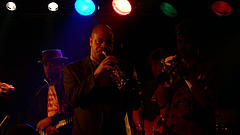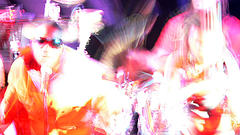
Burnt Sugar
7th May 2005, The Marquee
Burnt Sugar is a shifting
host of NYC-based musicians centred around Greg Tate, the group’s
musical director, organiser, polemicist and conductor. Over the course of
eight albums since their debut in 2000, Tate has conjured an unpredictable,
abstracted hybrid of different musical forms including breakbeat, funk,
soul, blues, jazz and so on using Butch Morris’s conduction technique.
Burnt Sugar evinces a breadth of ambition that’s signally impressive.
At the heart of their music is a crusading assertion of the vitality of
live performance to forge new possibilities in the face of the riptide of
the digital and the programmed. Burnt Sugar are a small army bent upon saving
souls from the predetermined.
Tonight the group are 13-strong, a leaner formation than their last, debut
appearance in the UK in 2003. They’re playing at the peripatetic Marquee,
recently hunkered down in Leicester Square. Unfortunately the group have
landed at short notice and with little promotion. As a result the crowds
swarming like slow-motion moths outside aren’t warming themselves
inside. Undeterred Burnt Sugar slip into their set gently with an ebbing,
flowing rhythm that gradually picks up momentum until it becomes a loping
breakbeat chant: hymnal, scarified and mantra-like. A momentary pause and
a new track births another new shape: percussion trio with trumpet. The
wah’ed slurs of Lewis ‘Flip’ Barnes’ solo invokes
the spirit of 70’s Miles Davis - one of the group’s pantheon
of spiritual ancestors – before other members of the Sugar cast/crew/family
are signalled to join in by Tate. There’s no sign of regular keyboard
players Vijay Iyer or Bruce Mack, but three singers stand abreast towards
the centre of the stage. They invoke an unearthly sense of crepescular soul,
both individually and together as a miniature chorus.
[Digression: The rightmost singer wears bug-eye shades as tattoos swim down his bare arms. His voice identifies him as Justice Dilla-X whose most remarkable performance is documented on 2001’s ‘Bas (Kis)’. On this track guitars maintain a firestorm attack that suddenly falls away - Justice continues acapella until his defiant freestyling falters - he acknowledges the failure and goes on hesitantly revealing real courage. The tension and humanity of that performance is formidable. Tonight his is a frequently forbidding and magnetic stage presence.]
Burnt Sugar are unhurried,
they’re going to take as long as they need to. There are also remarkably
few solos, this is a determinedly group music. There’s a strong feeling
of music being drawn out of darkness, of history being unearthed –
not in order merely to display it, to emptily show it off – but to
deal with its heritage, to rediscover and remould it and thereby project
it into the future, Art Ensemble/Sun Ra/Miles/Funkadelic/... style.
Dizzie’s difficult-not-to-recognise anthem Night In Tunisia, appears,
wisps of its melody fluttering like proud tatters as it launches into the
elsewhere before returning, departing and returning again. The group’s
not-so-secret weapon guitarist Rene Akhan, dressed like an outré
pirate has mostly lurked at the back of the stage. At a signal from Tate
he instantaneously ratchets up the pressure with squalling storms of noise.
Bodies begin to move, sway and grind. People grin. As the wall of sound
ceases, Tate who has stood besuited centre-stage facing the group for the
duration, turns and smiles at the audience. Defiant and justifiably righteous
though his journalism (most notably for the Village Voice) may sometimes
be, he’s disarmingly affable as he introduces the musicians. As the
encore finishes it’s felt like this wasn’t the group at full
throttle, but neither has it felt like a moment’s been wasted.
The vast majority of the 507 albums by 247 artists lasting a total of 21
days, 3 hours, 7 minutes and 49 seconds on my iPod slot relatively neatly
into one of a number of recognisable genres. So does Burnt Sugar. It’s
called Sui Generis. Before the concert Leicester Square had seemed chaotic,
walking home it seemed doubly so, yet its very heterogeneity feels newly
like a blessing.



